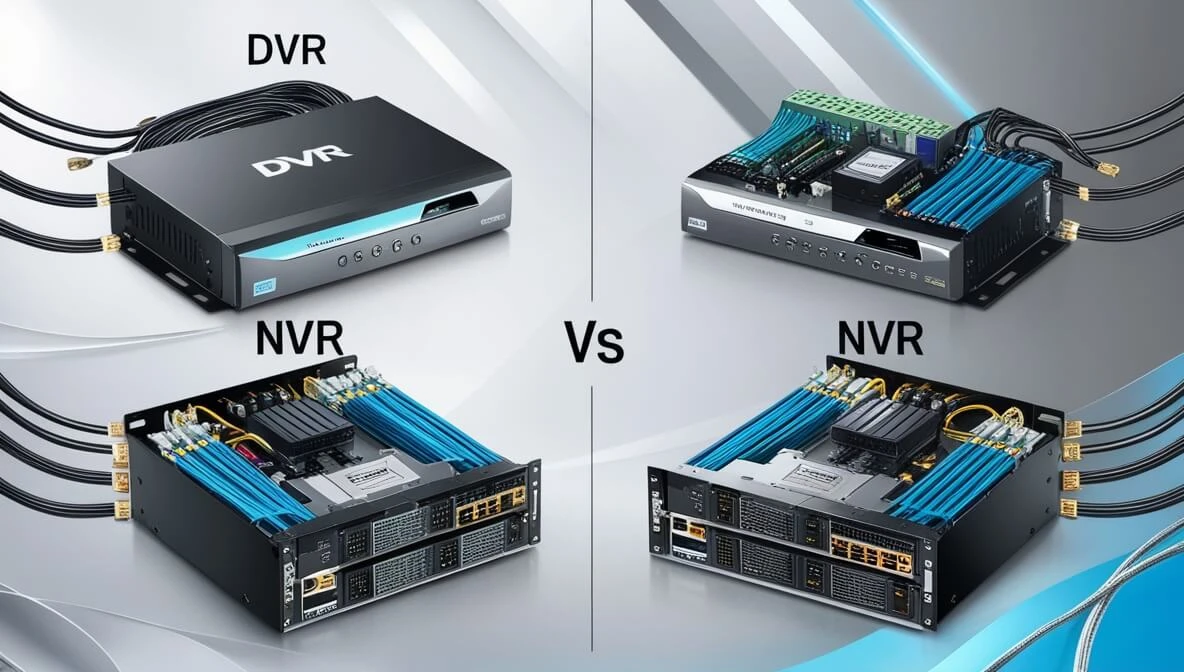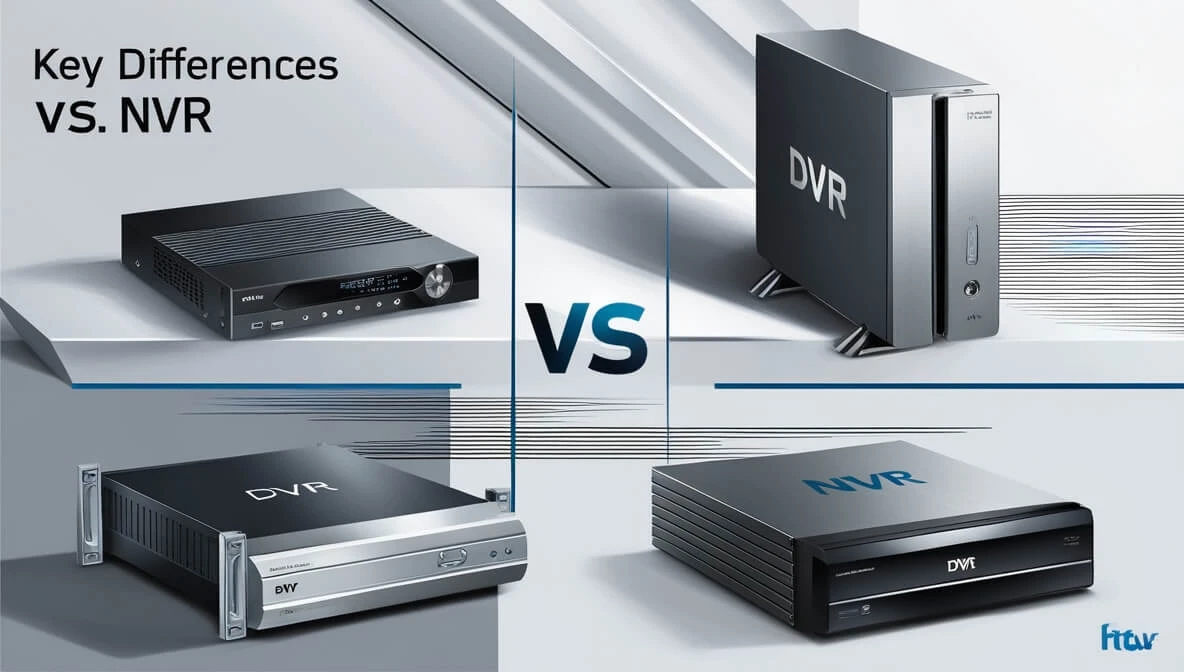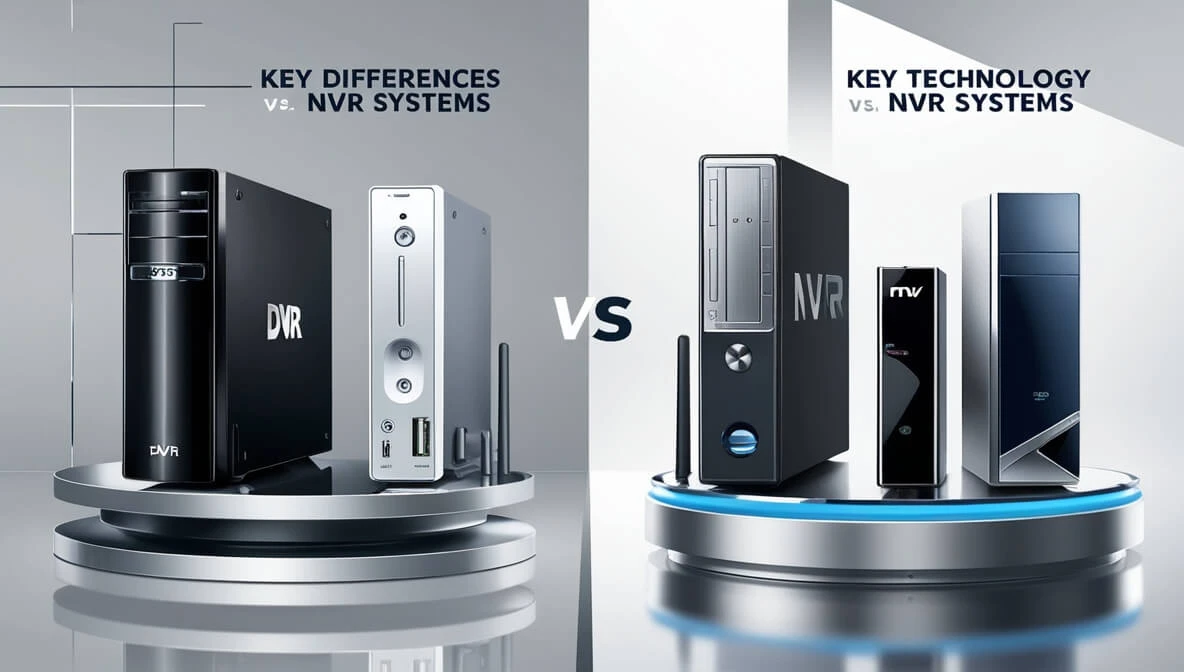DVR Vs NVR: What’s the Difference Between Them?

When it comes to setting up a camera for your home or business, you’ll likely come across the DVR Vs NVR debate. In short, the DVR stands for Digital Video Recorder, and the NVR stands for Network Video Recorder. And, they both hold some diversity.
Both systems differ in meaning, purpose, cabling, cost, video processing, video/audio support, storage, or installation factors.
Don’t worry if you are unaware of their differences. In this guide, we'll find out the main differences between DVR and NVR to help you make an informed decision. Let’s begin!
Difference Between the DVR Vs NVR!

In this section, you’ll find out the definition and other aspects to understand the core differences between the DVR and NVR systems:
What Is DVR vs NVR?
- DVR: A Digital Video Recorder (DVR) is a system that takes video to local storage devices like a hard drive.
- NVR: A Network Video Recorder (NVR) is a system that takes video or footage in digital format to a hard drive.
Key Differences Between DVR and NVR Systems

When it comes to video surveillance, knowing the differences between Digital Video Recorders (DVR) and Network Video Recorders (NVR) is important for choosing the right system for your needs. Each type has its own features that can help you secure your home or business. The table below provides a simple comparison of the key differences, making it easier for you to decide which option is best for you.
|
Feature |
DVR (Digital Video Recorder) |
NVR (Network Video Recorder) |
|
Purpose |
Works with analog cameras (CCTV) |
Works with IP cameras |
|
Cabling |
Uses coaxial cables |
Uses Ethernet cables (supports PoE) |
|
Video Processing |
Processes video at the DVR |
Processes video at the camera |
|
Audio Support |
Limited audio support; separate connections needed |
Better audio integration through Ethernet cables |
|
Storage Options |
Local storage only |
Local and cloud storage options available |
|
Cost and Installation |
Generally cheaper and easier to install |
More expensive and may require networking setup |
Tip: You can also know more about the difference between DVR and NVR in Bangla.
Key Differences Between DVR and NVR: A Detailed Explanation
If you're considering setting up a video surveillance system, you may have come across two popular options: Digital Video Recorders (DVR) and Network Video Recorders (NVR). While both serve the same purpose of recording video footage, they operate in different ways and come with distinct features. In this guide, we’ll break down the key differences between DVR and NVR systems, helping you understand which one might be the best fit for your security needs.
1. Purpose Using DVR And NVR
When you look at DVR and NVR purposes, you’ll notice their diversity. To put it clearly, the DVR system works with analog cameras (also known as CCTV cameras).
And, these cameras take raw video and send it to the DVR (where it is processed into viewable footage). Besides, analog cameras are less expensive and simpler. That also makes the DVR system more affordable but gives fewer advanced features.
On the contrary, the NVR system works with IP (Internet Protocol) cameras. These cameras also take video data before sending it to the recorder.
Thanks to this, they offer higher-quality footage and more advanced features such as facial recognition or motion detection. Besides, IP cameras are more versatile and often support both video and audio transmission. That also makes NVR less affordable.
Note: If you are clueless about the difference between CCTV and IP cameras, you can take a look at this guide.
2. Cabling System Of DVR And NVR
The cabling is another factor that poles DVR apart from NVR. Well, you’ll find the DVR needs coaxial cables to connect the cameras to the recorder.
And, they are thicker and harder to manage during installation. Not to mention they can only transmit video signals. This also means a separate cable is required to power each camera. Due to this, it is a little hard to set up.
However, the NVR system uses Ethernet cables. And, they are thinner and easier to manage during setup. Plus, they support Power over Ethernet (PoE).
With PoE, a single cable can carry power, video, and audio. That also makes the installation cleaner and more efficient.
3. Video Processing Capacity Of DVR And NVR
If talking about the video processing factor, you’ll find some differences between both systems. In a DVR system, the video data is transmitted as raw analog signals from the camera. And, it is processed by the DVR itself.
This also means the recorder handles video encoding. And, this can lead to limits in processing power and quality. In that case, each camera must be directly connected to the DVR. This also needs more cables and plugs.
Then again, the NVR system processes video data at the camera level. Since NVR works with an IP camera, it causes the IP cameras to encode. And then, this processes the video before sending it to the recorder.
And, this reduces the burden on the recorder. Plus, it allows you to get higher-quality video even if using motion detection and video analytics.
4. Video or Audio Support Of DVR And NVR
In terms of the audio support, you’ll find some differences between them. In the DVR system, you’ll find limited audio support. And, the coaxial cables don’t natively support audio. So, if you want to record sound, you’ll need to add separate RCA connections.
Moreover, the DVR has a fixed number of audio input ports. This also limits the number of cameras that can capture audio.
On the other hand, the NVR system offers better audio integration. Well, it mostly uses ethernet cables that can natively transmit audio signals. This also makes it timelier for setups that need both video and sound capture.
5. Storage Options Of DVR And NVR
The DVR and NVR systems come with diverse storage options. In that case, the DVR is typically limited to on-premise storage. That also means all footage is stored locally on the DVR’s hard drive.
And, this can limit the storage capacity and make it harder to access footage remotely. Plus, it is great for larger installations.
In contrast, the NVR system is more modern and often includes cloud storage options. Along with this, you'll find a local storage option.
Since it is connected to the network, it can upload footage to cloud-based servers. In other words, you'll find NVR with flexible and scalable storage to make remote access to video feeds and recordings easier.
6. Cost and Installation Of DVR And NVR
One of the most immediate differences between DVR and NVR systems is the cost and installation. To put it simply, the DVR system is generally reasonable when it comes to both device and setup.
But, if you need to add some gears to get the benefits of sound, it may raise the cost. Other than this, this can make DVRs more appealing.
However, the NVR system can cost more to buy from a store or set. This is also because it uses more advanced technology and often needs extra setup like networking infrastructure.
If you are looking for some best choices of NVR or DVR , then you can give it a look.You will find the best NVR or DVR here at a flexible price range.
Wrapping Up
Picking between DVR and NVR systems depends on what you need, how much you want to spend, and your choices.
Well, both are good for personal purposes. if you want a cheaper, easy-to-add, and work with CCTV cameras, the DVR would be ideal for you.
However, if you want better video and sound quality, refined features, and work with IP cameras, the NVR would be perfect.
To get a DVR or NVR system, you can visit Trimatrik or contact us to get some help choosing the right pick. Hope this guide helps you!




